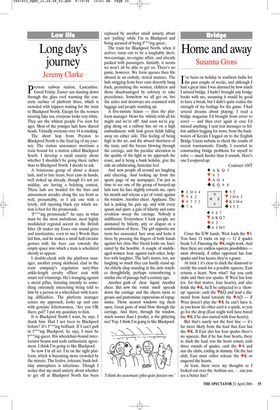Long day’s journey
Jeremy Clarke
Preston railway station, Lancashire. Good Friday. Easter sun slanting down through the glass roof warming the concrete surface of platform three, which is crowded with trippers waiting for the train to Blackpool North. Except for the women wearing fake tan, everyone looks very white. They are the whitest people I’ve seen for ages. Most of the younger lads have shaved heads. Virtually everyone over 14 is smoking.
The short hop from Preston to Blackpool North is the final leg of my journey. The station announcer mentions a train bound for a station called Blackpool South. I develop a small anxiety about whether I shouldn’t be going there rather than to Blackpool North. I decide to ask.
A boisterous group of about a dozen lads, mid to late teens, beer cans in hands, well stoked up already, though it’s not yet midday, are having a belching contest. These lads are headed for the bars and amusement arcades along the sea front as well, presumably, so I ask one with a lovely, still ripening black eye which station is best for the promenade.
‘F***ing promenade?’ he says, in what must be the most melodious, most highly modulated regional accent in the British Isles. (It makes my Essex one sound gross and inarticulate, even to me.) Words then fail him, and he makes a small half-circular gesture with his beer can towards the empty space into which a train is scheduled shortly to appear.
I double-check with the platform manager, another young skinhead, clad in the train company’s regulation navy-blue ankle-length cavalry officer coat with smart red trimmings. He’s lounging against a metal pillar, listening intently to something extremely interesting being told to him by a person in a wheelchair with learning difficulties. The platform manager senses my approach, looks up and says with genuine felicitousness, ‘Are you OK there, pal?’ I put my quandary to him.
It is Blackpool North I want, he says. I thank him. Had I not been to Blackpool before? It’s f***ing brilliant. If I can’t pull in f***ing Blackpool, he says, I must be f***ing queer. His wheelchair-bound interlocutor beams and nods enthusiastic agreement. I think I’m going to like Blackpool.
So now I’m all set. I’m on the right platform, which is becoming more crowded by the minute. The festive, tolerant, bank-holiday atmosphere is infectious. Though I notice that my small anxiety about whether to get off at Blackpool North has been replaced by another small anxiety about not ‘pulling’ while I’m in Blackpool and being accused of being f***ing queer.
The train for Blackpool North, when it arrives, turns out to be a laughably short, two-carriage, no-engine affair, and already packed with passengers. Initially, it seems we won’t all be able to get on. There’s no panic, however. We form queues then file aboard in an orderly, stoical manner. The lads swigging from beer cans decently hang back, permitting the women, children and those disadvantaged by sobriety to take precedence. Somehow we all get on, but the aisles and doorways are crammed with luggage and people standing up.
A five-minute hiatus — then the platform manager blows his whistle with all his might and we’re off! And soon we’re jogging along on a railway line set on a high embankment, with lush green fields falling away on either side. This feeling of being high in the air, and the absurd shortness of the train, and the breeze blowing through the carriage, and the peculiar alteration in the quality of the light as we approach the coast, and it being a bank holiday, give the ride an exhilarating, funicular feel.
And now people all around are laughing and cheering. And looking up from the sports page of my newspaper, I’m just in time to see one of the group of boozed-up lads turn his face slightly towards me, open his mouth and release a jet of vomit against the window. Another cheer. Applause. The lad is puking his guts up, and with every spasm and spurt a gale of hilarity and some revulsion sweep the carriage. Nobody is indifferent. Everywhere I look people are animated by hilarity, pity or disgust or a combination of these. The girl opposite me turns her nauseated face away and locks it there by pressing the fingers of both hands against her chin. Her friend looks on, fascinated by the horrible. A couple of middleaged women lean against each other, helpless with laughter. The lad’s mates, too, are laughing so much they can hardly stand up. An elderly chap standing in the aisle watches thoughtfully, perhaps remembering a similar rite of passage half a century ago.
Another gush of clear liquid. Another cheer. But now the vomit smell spreads down the carriage and the cheers turns to groans and pantomime expressions of repugnance. Those nearest windows tug them open. Great gusts of wind blow through the carriage. And there, through the window, much sooner than I predict, is the glittering sea! Yep. I think I’m going to like Blackpool.


































































 Previous page
Previous page